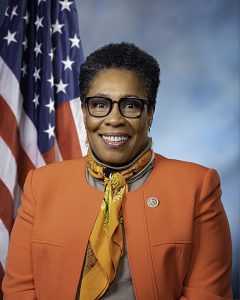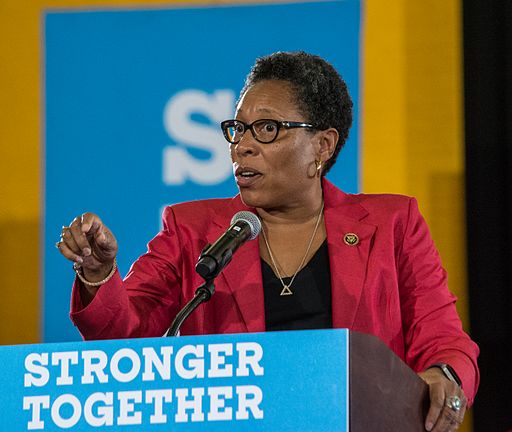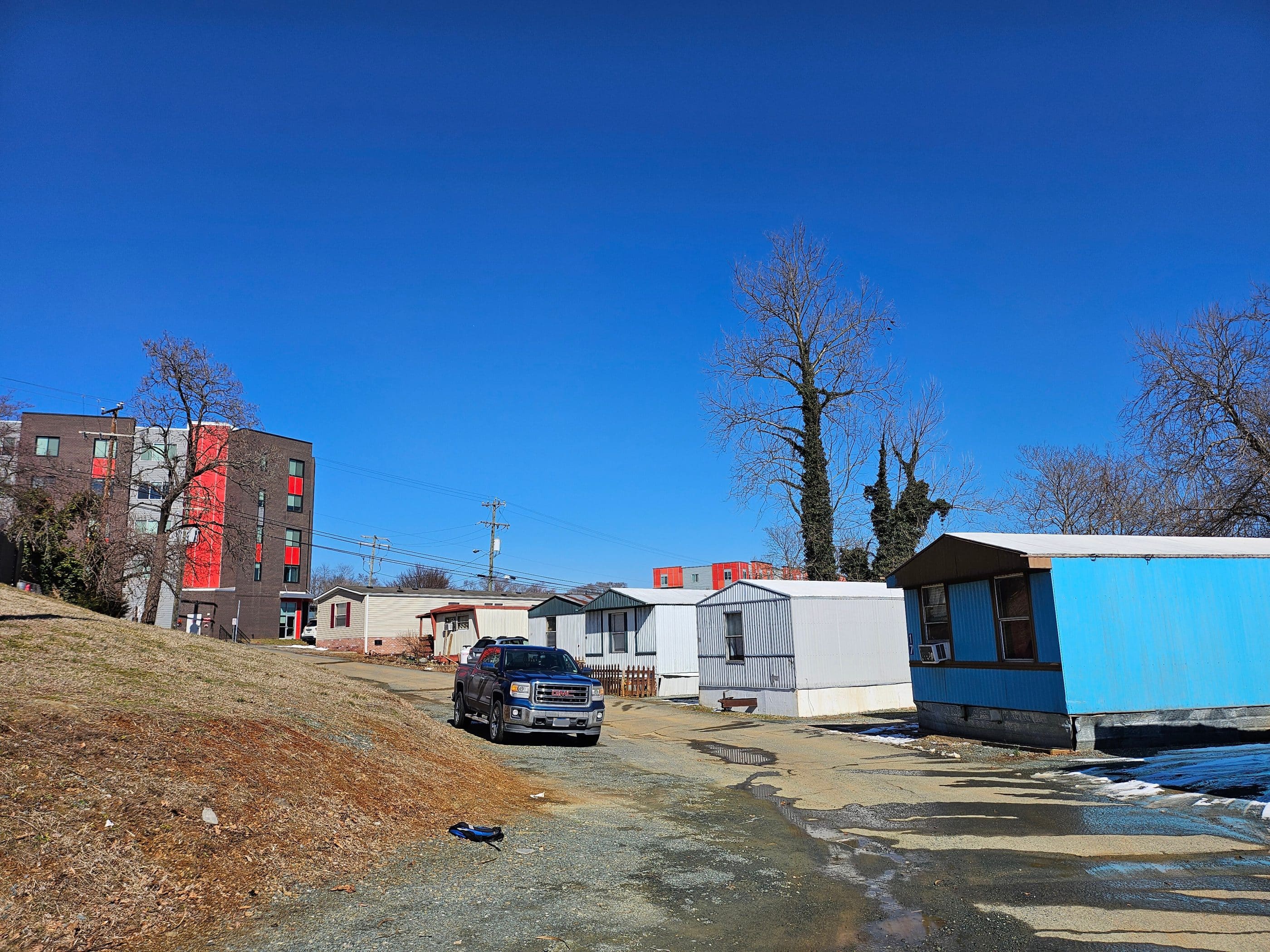
US House office of photography, Public domain, via Wikimedia Commons
In an unexpected move, last week the Biden transition team tapped Rep. Marcia Fudge to be the next HUD Secretary. Fudge represents the 11th District in Ohio, which includes much of Cleveland.
Fudge had lobbied for the Secretary of Agriculture position, and last month told Politico that it was too bad Black cabinet picks tended to be relegated to Labor or HUD. However, Tom Vilsack, former Secretary of Agriculture under President Obama, will return to that role, and Fudge has said she would be willing to step into whatever role she is needed for, even telling the Cleveland Plain Dealer that HUD was actually her “close second” pick.
Fudge has little experience with housing policy or housing-related Congressional committees and has not made it an explicit top priority of her time in office. In her interview with the Plain Dealer she appeared hard-pressed to name specifics of what has happened recently at HUD, good or bad. She has, however, focused on addressing issues of poverty, hunger, civil rights, and health, and housing advocates who have worked with her in Ohio say that they believe she understands how housing stability and affordability fits into that picture.
There are two strains of reaction to Fudge’s nomination in the housing world. One is a feeling that the choice by Biden of someone with little experience who clearly preferred another role reflects that he does not take housing policy as seriously as was hoped and that qualifications are taking a back seat to other considerations in the cabinet process (and those other considerations are not representation, since putting Fudge, a Black woman, at Ag would not have prevented his putting a qualified leader of color at HUD as well).
[Related Story: Who Were the Expected Contenders for the HUD Post?]
The choice is “breathtaking in its complete dismissal of urban issues and housing issues—given what we’re about to face” in terms of the mounting eviction and foreclosure dangers of the pandemic says James DeFilippis, a professor at the Edward J. Bloustein School of Planning and Public Policy at Rutgers University who has worked in the nonprofit housing sector and follows housing policy closely. “And it’s unfair to her, who by all accounts is a very thoughtful member of Congress.”
DeFilippis says he spoke with his colleagues in Cleveland, none of whom could tell him any position on housing issues Fudge had taken. Akira Drake Rodriguez, an assistant professor at the University of Pennsylvania’s Weitzman School of Design and Social of Social Policy and Practice who has a forthcoming book on public housing resident organizing in Atlanta, is working on a housing plan for Cleveland and said she had a similar experience. “We had a meeting yesterday, and no one mentioned Fudge going to HUD as a good thing for them,” she reports.
“We’re in a housing crisis that’s rightfully framed as a public health crisis, and this pick should be very important and it doesn’t seem like it is,” says Rodriguez. “It’s clear that his concern is not the concerns of the coalition that put him in.”
“This is a person with no portfolio in housing,” says DeFilippis. “This is not new—HUD has never been anything more than a backwater from the view of mainstream policy.” But, he argues, when we’re coming up on a massive crisis in municipal government finances, a foreclosure crisis, and an eviction crisis that is ongoing, with a lot of technical questions about financing and implementation to be figured out, a learning curve is something the country can’t afford. “By all accounts, this is a very confident, capable person who does care,” he says. “But I don’t care how smart you are, you don’t just walk in” to such a huge bureaucracy ready to learn on the job.
Some other housing advocates have echoed these concerns, or at least bewilderment, off the record, frustrated with what they feel is having to start again from square one. DeFilippis notes that since national housing advocacy organizations and their members will need to work directly with HUD, it’s difficult for anyone but independent academics to be vocally critical of the selection. (Witness the carefully worded welcomes extended to Ben Carson in 2017.)
But still, some, especially those who have worked with her, do have an actively optimistic perspective that exceeds the carefully politic. While being agnostic about whether the choice was made for the right reasons, they argue that that Fudge, based on her track record in Congress and her devotion to fighting poverty and inequity, is actually quite likely to provide a strong vision and voice for the agency and will be able to hire the technical expertise that she needs to get the job done.
While many in the housing field in Cleveland have not interacted much with Fudge, those who have are strong supporters. “Congresswoman Marcia Fudge is a great choice to lead HUD,” said Bill Faith, executive director of the Coalition on Homelessness and Housing in Ohio, in a statement on the nomination. “Rep. Fudge understands the plight of people who are struggling to pay the rent and put food on the table. With her solid track record on civil rights, we trust that HUD will finally make measurable progress on fair housing and equal access issues that have divided America’s communities for so long.”
A year ago, Fudge, as chair of the House Agriculture Committee, led the Democrats in resistance to the Trump administration’s attempt to cut the food stamp program and institute stricter work requirements for SNAP recipients, which would have cut food access for at least 700,000 Americans. “The president has cynically weaponized the USDA as a blunt political instrument, flying in the face of the department’s stated mission to ‘do right and feed everyone.’ It is a new low in the administration’s war on people in need,” Rep. Fudge wrote in a scathing Washington Post op-ed in December 2019. In October 2020, she called for a 15 percent increase in SNAP benefits.
In July 2020, Fudge, along with Rep. Barbara Lee (D-California) introduced a resolution calling on Congress to enact a “Poverty Bill of Rights,” which would affirm the right of all Americans to “live a life free from poverty and its impacts.” The list of 23 rights the bill asserts for everyone includes affordable housing, as well as broadband access, voting access, a living wage, and affordable and nutritious food.
The President-elect has asked me to serve as Secretary of Housing and Urban Development to make sure people in every part of this country get a chance to build a better life for their families.
It is an honor and a privilege to be a part of that important work.
— Marcia L. Fudge (@mlfudge) December 10, 2020
Fudge also serves on the House Committee on Education and Labor, including the subcommittees on civil rights and human services. She is a member of, and past chair of, the Congressional Black Caucus, and a member of the Progressive Caucus, among others. Earlier this year, she led a move to get direct funding for CDFIs included in the Paycheck Protection Program.
In a follow-up comment, COHHIO’s Faith told Shelterforce, “We’ve seen that Rep. Fudge hired excellent staff to help her push for expanded food access through the SNAP program in her role on the Agriculture Committee. So we are hopeful she will make solid choices when it comes to assembling a capable staff at HUD that will have strong housing knowledge and experience to help rebuild this agency.”
“Sometimes you have to teach policymakers” about poverty and inequality, and “sometimes you meet ones who already know these issues,” says John Corlett, president and executive director of the Center for Community Solutions, a nonpartisan think tank focused on solutions to health, social and economic issues that supports direct service organizations in Northeast Ohio. Rep. Fudge, he says, was one of the ones who already got it.
Corlett echoes Faith’s statement about Fudge hiring incredible people, calling her local staff “legendary,” and says that in her signature fight to expand food access, her staff worked successfully with the Republican-led Ohio Department of Child and Family services to roll out important programs. “We like when people cooperate, including across party lines,” says Corlett.
“There’s learning for everybody” moving into a new role, he notes, but importantly, he says, Fudge “understands how these issues are connected. In the health field, there’s a lot of focus on social determinants of health. For her that’s second nature. She knows housing insecurity leads to food insecurity . . . they’re all related.”
“Rep. Marcia Fudge understands that stable, affordable housing and quality health care go hand in hand, especially amid COVID-19, and that Black and Brown communities suffer the most from a lack of both. This is exactly the perspective we need to lead the department,” said Lisa Hershey of Housing California.
The National Fair Housing Alliance (NFHA) sees hope for fair housing enforcement in the choice. “NFHA is extremely encouraged by President-elect Joseph R. Biden’s selection of Rep. Marcia L. Fudge to lead HUD,” said Lisa Rice, president and CEO of the organization in a statement. “An unflagging advocate for civil rights, Fudge brings decades of experience as a public servant and a strong commitment to ensuring equitable access to credit, education, healthy food, clean environments, and other resources, which go hand in hand with access to housing.”
And while Fudge has focused on her role on the Agriculture Committee, she has in fact been a supporter of the HOME program and played a behind-the-scenes role in getting Hardest Hit Funds passed through the Treasury, activities highlighted in a statement by David Dworkin of the National Housing Conference. NHC has been encouraging its members to be vocal about welcoming Rep. Fudge on social media to raise her profile within the housing world.
“She’s seen as a fighter, someone who stands up for marginalized populations,” notes Mark Joseph, head of the National Initiative on Mixed-Income Communities at Case Western Reserve University in Cleveland. “She’s going to have a bit of a learning curve on some of the technical housing stuff, but when I think about getting a secretary at HUD who is not just going to look to get the trains moving, but ask hard questions, position the agency for big, bold moves, she’ll be ready to do that from day one.”
Before being elected to Congress, Fudge served as mayor of Warrensville Heights, a small inner-ring suburb of Cleveland. She has referred to that history, which included participation in the First Suburbs Consortium and support for the creation of the Cuyahoga Land Bank, as part of what she’ll draw on at HUD.
To DeFilippis, a city of “barely two census tracts” seems like poor preparation for overseeing a massive bureaucracy that oversees multiple housing authorities whose populations themselves dwarf the entirety of Warrensville Heights.
But Joseph sees it as a potential positive. “I think her having been mayor of an inner-ring suburb is intriguing because poverty is moving in that direction and she’ll know where federal policy works for these areas and where it doesn’t,” he said.
Despite her anger at the overall selection process, Rodriguez too sees some potential positives in Rep. Fudge’s approach. Referring to Fudge’s interview with the Plain Dealer where she said that HUD and the Department of Agriculture address “many of the same issues,” Rodriguez says she finds that kind of thinking promising. “I think it’s really great if people can get HUD to break out of its silo and work more with Department of Energy, Department of Ed, Department of Ag,” she said. “I think that’s wonderful.”





Simply a dumb, dumb choice to head HUD, especially when there are so many qualified possibilities instead. With the Trump administration eviscertating fair housing, assisted housing, and affirmatively furthering fair housing, HUD needs a Secretary with a solid understanding and experience in these fields. Sadly, Congresswoman Fudge is not that person. She’s going to have quite a learning curve.
Please don’t be so quick to judge. Often times we are out in a place that requires growth, for the appointed and for those they represent. Any positive push is surely needed, and also definitely warranted in the HUD sectors. Let time tell, but be open and supportive!
Having worked with Congresswoman Fudge since her mayoral days in Warrensville Heights, I know that any lack of institutional knowledge will be offset by her passion for addressing inequities, her ability to immerse herself into the position with an eye to systemic change, and her recruitment and retention of talent that will get the job done. I believe that the Department of Housing and Urban Affairs, in a very short time, will not look like, nor operate in a way that you see today. It will be incumbent on all of us to communicate the needs of our communities, to expect accountability, and to work side by side with the new Secretary to move the needs of affordable housing and community development forward. National NeighborWorks Association, and our members, are committed to work with future Secretary Fudge to make this happen.
Uplifting is much needed in HUD sectors right now. I join you in welcoming, and supporting Secretary Fudge! I am open to change, and willing to help as well!!
Representative Fudge is not that different from another Biden appointment that lacks the traditional resume for the job – Mayor Pete at Transportation. However both are universally acclaimed as quick learners, strong managers, and passionate advocates. Both enjoy the President’s trust and respect. I believe both will be fine.
Welcome to the changing of the guard…remember why you were appointed! Restore, preserve, conserve, and be fair! Welcome to the rebuilding of The United States of America!!